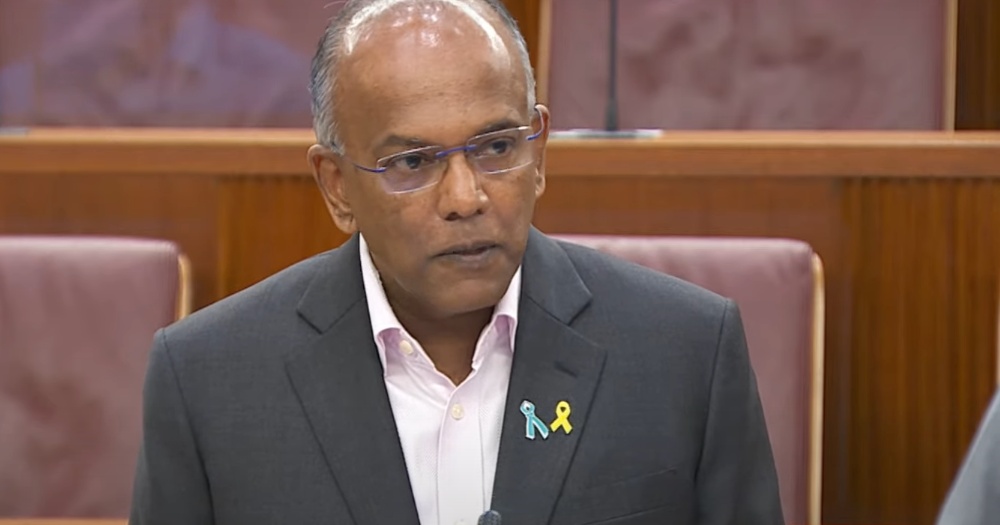The Attorney-General's Chambers (AGC) will generally object to rehabilitative sentences for adult offenders who commit certain sexual and hurt offences, as the need for proportionate punishment and deterrence must take precedence over rehabilitation.
This move, as part of a government review on the sentencing framework for such offences, was announced by Minister for Home Affairs and Law K Shanmugam, during a ministerial statement in Parliament on Friday (March 5).
In his speech, Shanmugam emphasised that the Singapore government takes a tough stance towards sexual and hurt offences, and that offenders should expect to face the full force of the law, no matter what their academic potential may be.
Review was conducted due to recent prominent cases
Recounted Shanmugam, several prominent cases in the past few years triggered discussion on whether the sentences imposed were adequate, with many discussing what more could be done.
He then cited examples of such cases, including the case of a 22-year-old university student who molested a woman on a MRT train, and was initially given 21 months of probation, after the probation report stated that his "good academic performance in school highlighted his potential to excel in life".
The Attorney-General's Chambers (AGC) later appealed against the probation given, and the High Court eventually imposed a two-week imprisonment sentence instead.
Shanmugam also cited the example of a 23-year-old university student, who used a handphone to record a video clip of a female person in the bathroom.
He was sentenced to a 14-day Short Detention Order and a 130-hour Community Service Order, and although AGC similarly appealed against the sentence, it was eventually upheld by the High Court.
Shanmugam said that these cases led to a sense that the sentences were "not adequate", with some asking whether the people involved were given more leniency due to their education qualifications.
Academic potential should not carry much weight
According to Shanmugam, the government takes a tough approach on sexual and hurt offences, and that sentences must reflect that such acts are deeply offensive to Singapore's fundamental values.
He said that outrage of modesty is "not merely an offence that a man commits because he is tempted by the way a lady dresses", and that voyeurism is not merely a "thoughtless act" that a young student commits in a moment of folly.
In general, there can be no excuses for these offences, and that mitigation pleas based on the offender's educational qualifications or academic potential "should not carry much weight".
For such offences, proportional punishment and deterrence should take precedence over rehabilitation.
"You shouldn't be able to come to court and say, you have a bright future, you will go far and so on. You can go far, but first, serve the sentence," said Shanmugam.
Penalties for certain sexual offences to increase
Shanmugam announced that MHA and MinLaw will take three steps to review current laws and policies.
First, there will be an increase in penalties for three specific sexual offences.
The maximum imprisonment term will be increased from two years to three years, in order for more egregious cases to be dealt with more severely.
The penalties for the following offences will be increased from one year to two years' imprisonment:
- Having sexual activity in the presence of a minor or showing a sexual image to a minor between the ages of 14 and 16 years old.
- Exploitative sexual activity in the presence of a minor or showing a sexual image to a minor between the age of 16 and 18 years old.
AGC to generally object to rehabilitative sentences for adult offenders
Second, unless there are exceptional circumstances, the AGC will also generally object to rehabilitative sentences for adult offenders who commit certain sexual and hurt offences.
Due consideration will be given to certain cases, such as where the offender is someone with an intellectual disability, or is suffering from a treatable psychiatric condition that contributed to the commission of the offence.
MHA and MinLaw to publish guide on sentencing in Singapore
Finally, in order to better educate the public about the sentencing process, MHA and MinLaw have collaborated with AGC and the Law Society, to prepare a guide on sentencing in Singapore.
This guide explains the sentencing process in Singapore's courts, and addresses many important questions of public interest, including how the Court decides what sentence to impose, and what factors the Court takes into account during sentencing.
This guide will be published on the MHA, MinLaw and AGC websites.
"In respect of sexual and hurt offences, based on what I've said, it should be clear that an offender will not receive a lighter sentence simply because he has higher educational qualifications or has better prospects in life," Shanmugam said.
Sentencing Advisory Panel to be set up
In order to achieve greater consistency in sentencing, MHA and MinLaw will set up a Sentencing Advisory Panel, which can set out a sentencing framework based on factors of harm and culpability and issue non-binding sentencing guidelines.
Shanmugam said that he envisions the Panel to consult other stakeholders where appropriate, providing greater clarity to the public about the likely sentence, and the relevant factors to be considered in sentencing.
This is different from what is currently done, where the legislation only sets out the maximum penalties.
This will be an Inter-Agency Panel, with stakeholders from the criminal justice system, including members of the Judiciary, AGC, MHA and the Singapore Police Force (SPF).
More details on the panel will be provided later.
Top image via MCI's YouTube channel.
If you like what you read, follow us on Facebook, Instagram, Twitter and Telegram to get the latest updates.
